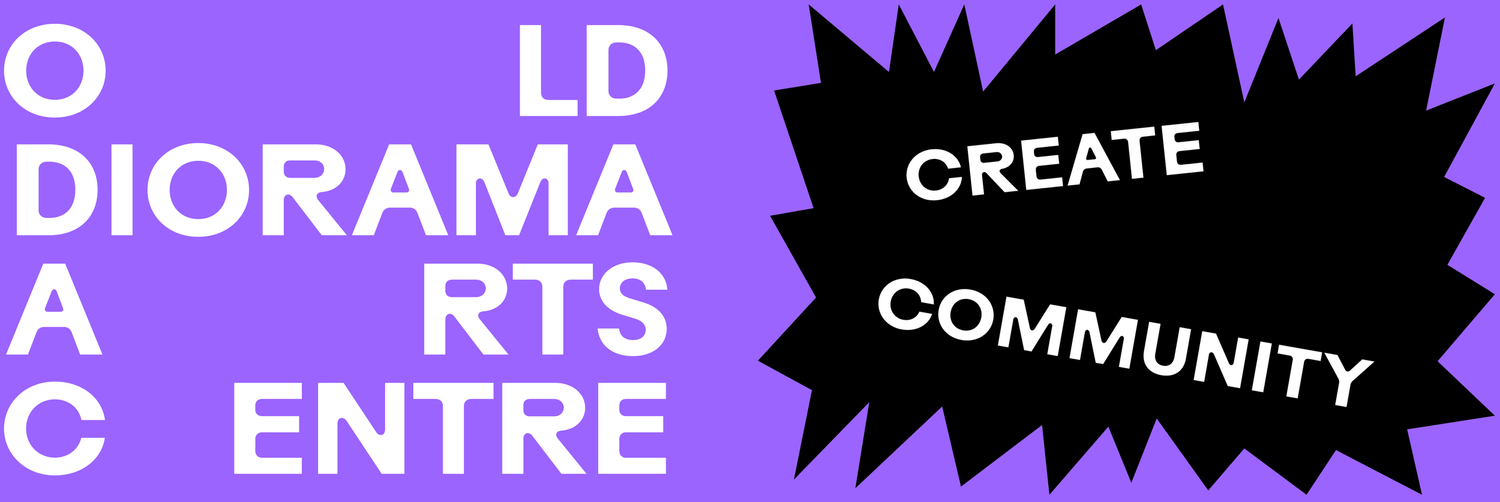IN THE SPACE WITH… HELEN EPEGA - SONG QUEEN: A PIDGIN OPERA
At the core of Old Diorama’s charitable purpose is providing space and opportunities for local and creative communities, and - in so doing - we are fortunate to meet fascinating people doing inspiring things. This is the latest in a series of interviews with some of the creative people we support and commission at ODAC.
Helen Epega was one of our 2025 New Narratives residents. Her project, Song Queen: A Pidgin Opera, blends African percussion and Western classical music, performed in Pidgin English and other global dialects. It challenges the traditions of Western opera and celebrates multilingual, multicultural expression. The opera was staged at Wilton’s Music Hall in April 2025, marking a major milestone in its journey.
What’s your story as an artist, and what has shaped your practice to this point??
I am a composer, librettist, and performer working across opera, African and multicultural colloquial oral traditions, and classical music. My practice is rooted in harnessing both form and language and creating new spaces where African narratives can thrive within genres that have historically excluded us.
I am always drawn to the questions: Who gets to tell the story? In what language? On whose stage? Most of all: What if the future of opera is multilingual, multicultural, and fiercely inclusive?
Tell us about the show you’ve been rehearsing at ODAC — what’s it about?
With Song Queen: A Pidgin Opera, I set out to centre African voices in opera, using Pidgin English as a bold, transformative tool. My journey began with a dream to share positive African narratives and has grown into building full-scale operas that blend Afrobeat, folk traditions, and classical forms. Song Queen: A Pidgin Opera is the world’s first opera written and performed in Pidgin English. It harnesses Nigerian folk music and rhythms with classical opera to tell a story of female empowerment, cultural resilience, and transformation. This work is about reclaiming space linguistically, musically, and spiritually. The narrative challenges the Western canon, placing African heritage on equal footing. Pidgin English, often dismissed or caricatured, becomes a vessel for high art, complex storytelling, and deep emotion. That shift is powerful.
Where did this project begin for you?
The idea came from my desire to hear my mother tongue on an operatic stage, this then developed to a desire to see broader African culture reflected in the artform. I want my children and their peers to know that opera can sound like them, move like them and speak to their histories.
What do you hope this piece might offer to the people who see it — or the wider community it connects to?
For audiences, I hope this piece brings joy, affirmation and a sense of expansion. It’s Africa to the world. It’s love, belonging, including all! For those who share my cultural background, I hope it brings pride. For those new to this musical language, I hope it opens hearts and minds. For everyone, I hope they feel welcome, safe and celebrated in the magical world of ‘Song Queen: A Pidgin Opera’.
What is next for the show?
We just completed a very successful run at Wilton’s Music Hall in April 2025 and we’re now planning a UK and international tour next year. There’s real momentum and I’m excited for what’s next. Before that, I’m debuting my new post apocalyptic opera ‘Of Earth and Quill’ at Tete a Tete: The Opera Festival on 1st October 2025 at the Cockpit Theatre in Marylebone, London.
Have there been any turning points, challenges, or discoveries that happened in the studios at ODAC?
ODAC gave us something invaluable: space, both physical and mental. The residency allowed us to truly workshop the production, not just rehearse it. That distinction and process matters. We could dive deeper into staging, develop choreography, refine transitions and make collaborative choices with time and clarity. This kind of creative freedom is a rare luxury when working within tight budgets and compressed schedules. Returning audience members noticed that the show felt sharper, fuller and more elevated, thanks to ODAC’s support. A key turning point was our first full day in the large studio, when the cast could finally block and move freely through the space. It changed the rhythm and energy of the entire show.
ODAC is proud to host the New Narratives residency programme. Do you have any thoughts or feedback for us, or anything you’d like to see us do more of?
Places like ODAC are vital to the ecosystem of new opera and performance in this country. They give breath to voices and visions that might otherwise be squeezed out. I am deeply grateful for the New Narratives residency; it reminded me that my work has space to grow and that there are places willing to nurture bold, culture-shifting stories. It was really wonderful to welcome Daniel Pitt (ODAC Creative Director and Chief Executive) to one of our shows. That meant the world, and I’m excited and grateful to receive both Daniel and Tom’s continued support as well as to continue to explore other collaborative opportunities together. Thank you, ODAC, for believing in me, Song Queen: A Pidgin Opera, and in the transformative power of new narratives.




